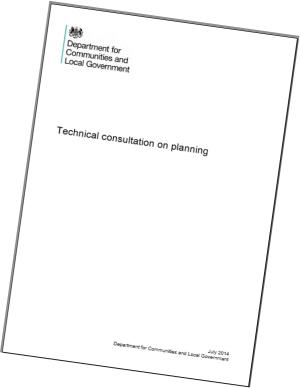
Find more posts
Government planning proposals: further relaxation for residential conversions
Latest
August 4, 2014



In a consultation document issued on 31st July, the government announced plans for further relaxations around the conversion of commercial property to residential use.
The two key proposals are in Section 2 of the Consultation document ("Reducing planning regulations to support housing, high streets and growth") and were as follows:
existing industrial/employment area". There is an indication that the change of use might be restricted to more isolated buildings but not to those situated in "business" or "industrial" estates. Sui generis uses As noted the proposal is to extend permitted development rights, with a prior approval process, to the following sui generis uses: launderettes, amusement arcades/centres, casinos and nightclubs (this is the full list, not a number of examples). Reading between the lines, these seem to have been selected on the basis that they have extended opening hours and thus potentially produce more anti-social impacts. The permitted development rights are also proposed to include the right for limited external works such as changes to frontages, windows and doors though there is also a mention of possibly needing prior approval for "design and external appearance of the building", which might cut across this in some respects. Consolidated General Permitted Development Order A further proposal that will be welcomed by any lay person trying to get to grips with the General Permitted Development Orde (particularly as it applies to conversions) is the proposal to consolidate it: this means the regulations would be in a single document rather the users having to wade through over 20 separate amending regulations since the GPDO was first introduced in 1995. The consultation comments that this "will make the regulations more accessible and easier to use": for anyone without access to a legal encyclopaedia this might more accurately have been phrased "will make the regulations accessible and possible to use". Deadline for responses The consultation is due to end on 26th September 2014.
- to implement a permanent but refined "prior approval" regime for conversion of offices to residential use, currently due to expire at the end of May 2016;
- to introduce the similar "prior approval" regime for light industrial units (Use Class B1(c)) and storage and distribution bulidings (B8) and some sui generis uses such as laundrettes, casinos, amusement arcades and night-clubs.
existing industrial/employment area". There is an indication that the change of use might be restricted to more isolated buildings but not to those situated in "business" or "industrial" estates. Sui generis uses As noted the proposal is to extend permitted development rights, with a prior approval process, to the following sui generis uses: launderettes, amusement arcades/centres, casinos and nightclubs (this is the full list, not a number of examples). Reading between the lines, these seem to have been selected on the basis that they have extended opening hours and thus potentially produce more anti-social impacts. The permitted development rights are also proposed to include the right for limited external works such as changes to frontages, windows and doors though there is also a mention of possibly needing prior approval for "design and external appearance of the building", which might cut across this in some respects. Consolidated General Permitted Development Order A further proposal that will be welcomed by any lay person trying to get to grips with the General Permitted Development Orde (particularly as it applies to conversions) is the proposal to consolidate it: this means the regulations would be in a single document rather the users having to wade through over 20 separate amending regulations since the GPDO was first introduced in 1995. The consultation comments that this "will make the regulations more accessible and easier to use": for anyone without access to a legal encyclopaedia this might more accurately have been phrased "will make the regulations accessible and possible to use". Deadline for responses The consultation is due to end on 26th September 2014.
